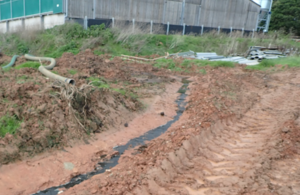Somerset pig farmer counts the cost of slurry pollution
Pig slurry overflowed from the store, got into surface water drains and then the stream.

Slurry escaped from the store and polluted a nearby stream.
- James Mitchell built an illegal slurry lagoon which overtopped causing pollution
- The avoidable incident occurred as pig slurry escaped into the Oake Stream nearby
- The experienced farmer pleaded guilty to the offences and was fined a total of £5,065, including costs
A Taunton pig farmer has been prosecuted by the Environment Agency for allowing slurry to escape from an illegally constructed slurry lagoon causing pollution of the Oake Stream in Somerset.
James Mitchell, of Hillcommon in Taunton, Somerset appeared before Taunton Magistrates Court on Wednesday, 18 June 2025. Mr Mitchell pleaded guilty to two offences and was fined £500 with a £200 surcharge and was ordered to pay £4,365 in investigation costs after the District Judge gave him full credit for his guilty pleas. The fine was based on his means as disclosed to the court and he was given 12 months to pay.
The court heard that the agency visited Orchard farm in 2021, at James Mitchell’s request. The agency identified a slurry lagoon that had been constructed without prior notification and with no details on how it had been correctly sized or engineered.
The visit had been arranged to discuss proposed grant funding for roofing work which it was hoped would reduce the pollution risk. The agency had no objections to roofing work being completed on the condition that the slurry store was made compliant.
Pollution in stream traced to Orchard Farm
On 9 November 2023, the Environment Agency received a report of pollution in the Oake Stream. Officers traced the source of the pollution to Orchard Farm where pig slurry was found overflowing from the slurry store and entering a soakaway which is connected to the surface water drainage network.
Mitchell cooperated with the investigating officers and prevented further slurry entering the drains by initially building an earth bank which was later reinforced with additional clay.
At a follow-up visit in December 2023, Environment Agency officers noted that the construction of the roof, originally discussed in 2021 was underway. These works were completed by January 2024.
David Womack, of the Environment Agency, said:
James Mitchell is an experienced farmer and was made fully aware of his responsibilities and the laws regarding slurry storage, having contacted us before this needless incident occurred.
Regulations on how to properly construct slurry stores and the need to notify the agency prior to constructing any new slurry store have been in place for more than 30 years. All farmers need to be aware of their legal responsibilities to prevent pollution events like this from happening.
We won’t hesitate to take action against those who cause pollution having failed to take on board our advice and guidance. I’d strongly advise those who need advice or who think that their slurry storage facilities are too small or a pollution risk to contact us as we would prefer to prevent this type of incident from occurring in the first place.
The Environment Agency provides specialist advice to help farmers assess their existing slurry storage facilities to reduce pollution risk and to ensure the environment is properly protected.
Guidance for farmers on appropriate slurry storage is available: Storing silage, slurry and agricultural fuel oil - GOV.UK
Background
James Mitchell was charged with the following offences:
-
On or before 9 November 2023, James Mitchell caused or permitted a water discharge activity, namely a discharge of pig slurry, into Oake Stream, except under and to the extent authorised by an environmental permit. Contrary to Regulation 38(1)(a) and Regulation 12(1)(b) of the Environmental Permitting (England and Wales) Regulations 2016.
-
James Mitchell, on or before 9 November 2023 at Orchard Farm, Hillcommon, Taunton, Somerset, TA4 1DW failed to store slurry in a slurry storage system which satisfied the requirements of Schedule 2 (6) (3) (c) of the Water Resources (Control of Pollution) (Silage, Slurry and Agricultural Fuel Oil) (England) Regulations 2010 in that there is the need to provide at least 750 millimetres of freeboard in the case of a tank with walls made of earth and 300 millimetres of freeboard in all other cases. Contrary to Regulation 10 (1) and 4 (1) of the Water Resources (Control of Pollution) (Silage, Slurry and Agricultural Fuel Oil) (England) Regulations 2010.